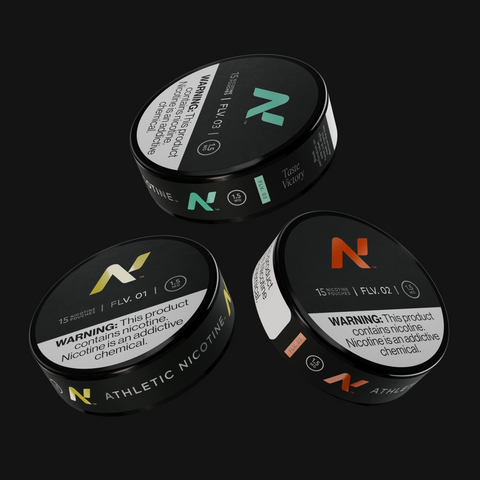
The Unexpected Edge: How Low-Dose Nicotine Affected Elite Baseball Players
Research Review: Acute Effects of Nicotine on Physiological Responses and Sport Performance in Healthy Baseball Players
Key Takeaways:
- A recent study examined the effects of low-dose nicotine on cognitive function, autonomic activity, and baseball-hitting performance in non-smoking elite baseball players.
- HRV and salivary biomarkers showed increased sympathetic nervous system and endocrine activity after nicotine intake.
- The nicotine group demonstrated improved cognitive performance, with motor reaction time decreasing by 11.14% and 5.72% in separate tests.
- Baseball-hitting performance improved by an average of 34.69%, though effect sizes were small.
In elite sport, milliseconds matter. Reaction time, fine motor skills, and focus can make the difference between winning and losing. While athletes continuously seek ways to optimize their performance, emerging research highlights an unconventional but compelling tool: low-dose nicotine.
A recent study investigated the effects of nicotine use supplementation on cognitive function, muscle strength, and baseball-hitting performance. The findings suggest that low-dose nicotine, may play a role in enhancing cognitive processing, reaction time, and precision—key attributes for elite-level performance.
Sport Performance Study Methodology
This observational study recruited thirteen healthy male baseball players from the National Taiwan University of Sport (1). All participants were elite athletes, performing at national-level athletic performance with a training history of at least nine years. They had never smoked and were required to abstain from stimulants such as coffee or energy drinks for 12 hours prior to testing. The study followed a crossover design over seven days, where participants had a low-dose 2 mg nicotine or a placebo for 30 minutes before undergoing a series of tests.
The experimental protocol included three saliva collection stages (before, immediately after taking, and post-testing) to measure nicotine metabolites and stress-related biomarkers. Participants were then assessed for:
-
Cognitive function
-
Muscle strength
-
Heart rate variability (HRV)
-
Baseball-hitting performance
Key Findings for the Effects of Nicotine
The study found that a low dose of 2 mg of nicotine led to notable improvements in several performance metrics. The baseball players experienced an improvement in the following exercise performance metrics :
-
Cognitive performance: Reaction times improved by approximately 11%, and hand-eye coordination improved as evidenced by faster completion times of the test.
-
Autonomic response: Nicotine increased heart rate and significantly elevated stress response markers such as salivary α-amylase activity, indicating a higher activation of the nervous system, which improves alertness.
-
Baseball-hitting performance: The nicotine group had a significantly higher hitting accuracy (33.0% ± 23.7% vs. 24.5% ± 17.7%) and greater improvements in bat swing speed over time compared to the placebo group.
-
Muscle strength: Nicotine administration however did not improve absolute or relative isometric strength in any tested muscle groups in this study.
Cognitive Benefits of Low-Dose Nicotine for Athletic Performance
Cognition is the foundation of athletic success. From tracking a fast-moving ball to making split-second decisions, the brain’s ability to process information efficiently is crucial for physical performance. The study revealed that athletes who consumed low-dose nicotine exhibited improved reaction times and fine motor control, resulting in a significant boost in hitting accuracy.
Consistent with systematic review evidence, nicotine’s ability to stimulate acetylcholine receptors in the brain may enhance attention and mental processing speed (2), contributing to better decision-making and speed of decision-making performance in precision-based sports.
HRV and Sympathetic Activation: A Sports Performance Advantage
Nicotine’s short-term impact on heart rate variability (HRV) and autonomic nervous system activity was another critical finding. The study reported an increase in sympathetic nervous system activation, boosting cardiovascular and metabolic function, increasing blood flow, and raising blood pressure. These cardiovascular changes heighten alertness and readiness. This physiological response may help athletes stay engaged and responsive under pressure, particularly in sports requiring intense concentration and rapid reflexes.
The study analyzed stress-related biomarkers, including salivary cortisol and alpha-amylase activity. The researchers observed while the use of nicotine activated the sympathetic nervous system, its use also led to a deeper parasympathetic response. This combination suggests that low-dose slow-release nicotine may provide a balanced enhancement of alertness without excessively elevating stress hormones.
Why Low-Dose Nicotine?
Unlike traditional tobacco products, smokeless tobacco use, and other forms of nicotine (like cigarette smoking, smokeless tobacco, snus, chewing tobacco, nicotine gum, and vaping), clean nicotine pouches offer a controlled and measured nicotine intake without the harmful side effects of smoking. On the monitoring program for the World Anti-Doping Agency (WADA), this method of delivery provides a slower onset of action, allowing for cognitive and performance-enhancing benefits with a controlled release. Additionally, previous research has linked nicotine to improvements in working memory, attention, and fine motor control, reinforcing its potential as an aid for athletes in high-precision sports (3).
Conclusion
This study sheds light on the potential ergogenic effects of low-dose nicotine in elite athletes. Future research should explore long-term effects, optimal dosing strategies, effects on endurance performance, anaerobic performance, power output, body weight exercise, and individual variability in response. While nicotine is not a typical performance-enhancing supplement, its ability to sharpen cognitive and motor functions, without the negative effects of tobacco smoke or smokeless tobacco, warrants further investigation in the realm of sports science.
References
-
Fang S-H, Lu C-C, Lin H-W, Kuo K-C, Sun C-Y, Chen Y-Y, Chang W-D. Acute Effects of Nicotine on Physiological Responses and Sport Performance in Healthy Baseball Players. International Journal of Environmental Research and Public Health. 2022; 19(1):515. https://doi.org/10.3390/ijerph19010515
-
Gil SM, Metherate R. Enhanced Sensory–Cognitive Processing by Activation of Nicotinic Acetylcholine Receptors. Nicotine & Tobacco Research. 2019;21(3):377-382. doi:10.1093/ntr/nty134
-
Heishman SJ, Kleykamp BA, Singleton EG. Meta-analysis of the acute effects of nicotine and smoking on human performance. Psychopharmacology (Berl). 2010;210(4):453-469. doi:10.1007/s00213-010-1848-1
